Tag Archive: Gibran Rivera
September 13, 2016
Think like a network, act like a node.
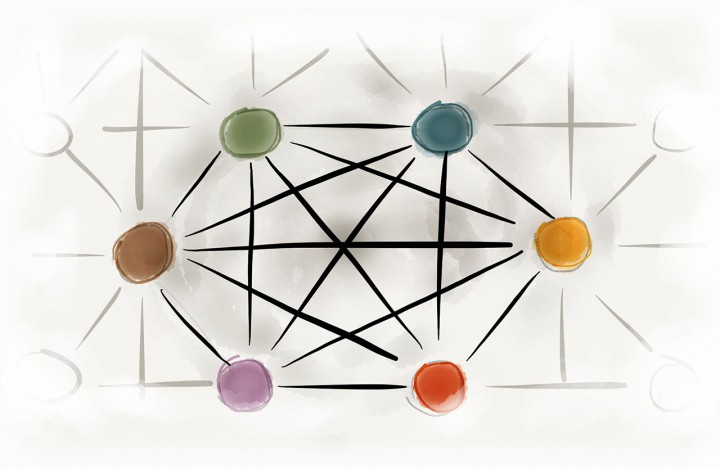 At IISC, we continue to emphasize that networks, not organizations, are the unit of social change. Part of the reason for this is that networks at their best are able to leverage what are known as “network effects.” These effects, as described by Madeleine Taylor and Peter Plastrik, include the following:
At IISC, we continue to emphasize that networks, not organizations, are the unit of social change. Part of the reason for this is that networks at their best are able to leverage what are known as “network effects.” These effects, as described by Madeleine Taylor and Peter Plastrik, include the following:
Rapid Growth and Diffusion
Through its myriad nodes and links, as well as the ongoing addition of participants and new pathways, a dense and intricate network can expand quickly and broadly. This can be critical for spreading information and other resources and mobilizing actors in ways that organizations simply cannot achieve.
Read More
April 21, 2016
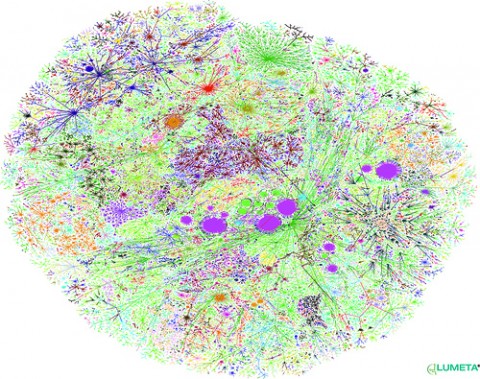
Image by Steve Jurvetson
Much of the work we do at IISC includes some element of helping to develop networks for social change. This entails working with diverse groups of individuals and/or organizations to come together and create a common vision and clear pathway to collective action and impact. I’ve been reflecting on how important it can be to not simply focus on creating or developing networks “out there” and across traditional boundaries, but also “in here,” within different recognized borders.
“When a living system is suffering from ill health, the remedy is found by connecting with more of itself.”
– Francisco Varela
The notion that part of the process of healing living systems entails connecting them to more of themselves is derived, in part, from the work of Francisco Varela, the Chilean biologist, philosopher and neuroscientist. As Varela and others have surmised, living systems are networks, including individual people, groups, organizations, and larger social systems. Furthermore, they have noted that when a living system is faltering, the solution will likely be discovered from within it if more and better connections are created. In other words, as Margaret Wheatley puts it,
“A failing system [or network] needs to start talking to itself, especially to those it didn’t know were even part of itself.”
I find it interesting in the context of social change work to consider how the process of re-connecting at and within different systemic levels can be beneficial to those levels and initiatives as wholes.
Read More
March 12, 2015
“We add value to society-at-large when we dare to connect.”

This week I was in a conversation with someone who asked me what the difference is between “networking” and “network building.” I’ve been asked this before, and certainly do not purport to have the right answer, but it became an opportunity to deepen the conversation that has been evolving in my work and head about what it means to develop potential through and in networks. Here is what popped to mind as a response, actually in the form of a series of questions
Are you thinking about others?
Read More
April 16, 2014

Photo by Kevin Doyle. Some rights reserved.
Conferences and other large in-person convenings provide a great opportunity to launch and further develop networks for social change. As has been mentioned previously on this blog, and borrowing from the work of Plastrik and Taylor, at IISC we see networks for change as developing in various inter-related “modes,” including connectivity, alignment, and action. Paying attention to multiple dimensions of success can inform a variety of approaches to support a more robust, trust-bound, commonly-oriented, self-organizing and (as needed) formally coordinated collective.
Here are some methods to consider for convenings to help feed and grow networks for social change: Read More
December 30, 2012
“If you want to go fast, go alone. If you want to go far, go together.”
-African proverb
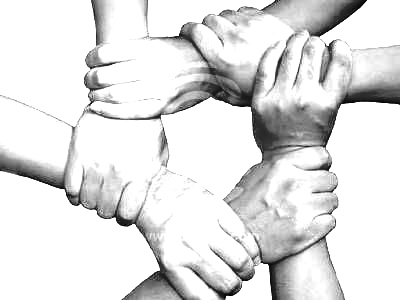
This coming Sunday, my colleague Gibran Rivera and I will be presenting at the Connecting for Change Conference (Bioneers by the Bay) in New Bedford, MA. This is one of my favorite events each year, as it gathers many thoughtful and innovative presenters and participants from local/regional and national/international levels to talk about how to create whole (just and sustainable) communities. In our workshop, “Are You Down With D-I-T? Skills for Change in a Network World,” Gibran and I will guide attendees through an exploration of the convergence of two of today’s powerful memes – the DIY (Do It Yourself) movement, which seems to be fueled in great part through younger generations and social media, and “collective impact,” made popular by FSG in its SSIR articles. Read More
December 27, 2012

IISC would like to share our Top 5 most influential post of 2012! Join us until the New Years Eve when we reveal our number 1 blog post!
The following post began as a response to FSG’s lastest contribution to its work around “collective impact” on the Standford Social Innovations Review blog. There is much value in the additional details of this cross-sectoral approach to creating change, and I especially appreciate what is highlighted in this most recent piece regarding the strengths and weaknesses of different kinds of “backbone organizations” to support and steer the work. In the ensuing conversation on the SSIR blog, there is a comment from an FSG staff person about the importance of building trust in launching these efforts, and it was from this point that I picked up . . .
With deep appreciation for the good work of FSG in helping to codify this important approach, I wanted to add that from our experience at the Interaction Institute for Social Change, helping people develop the skills of process design and facilitation is of paramount importance in cultivating trust and ultimately realizing the promise of large-scale multi-stakeholder collaborative efforts. Read More
October 31, 2012

|The Alchemy of Wholeness by Armanda Moncton|http://www.flickr.com/photos/armandamoncton/1705798622|
On Sunday, Gibran Rivera and I facilitated a workshop at Connecting for Change/Bioneers by the Bay about change practices for a networked world. Another way of thinking about what we were exploring was to put it in terms of “practices for wholeness.” Part of our premise was and is that we are suffering from a worldview that leads with and to fragmentation and fixity. This is part of our inheritance from the industrial age that strives to understand through division and an associated mindset that believes we can make a separation between observer and observed with no associated impact. For certain tasks, of course, it makes sense and is possible to divide, diagnose and put back together. But this does not make sense, nor is it possible, in the case of complex living systems. Furthermore, we have gotten ourselves in a bind because our habits of thought have led us to thinking that the divisions and categories we have created are in some sense primordial. And so we are hard pressed to believe, or remember, that what we do to our “environment” or “others” we do to ourselves! Read More
September 26, 2012
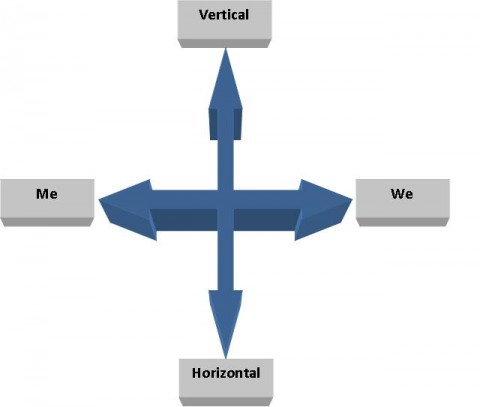
I want to tip my hat to mentors and thought partners, both near and far, for fueling my thinking around the topic of this post – thanks to Carol Sanford, Richard Hawkes and Tom Lombardi at Growth River, Glenda Eoyang, Richard Barrett, and my IISC colleague Gibran Rivera. There is much discussion in the social sectors these days about the need to be more fearless, to take risks, to fail early, to be innovative and vulnerable. Influenced by my colleagues, I like to frame all of this as being about our need to think and act more “vertically,” that is, with an evolutionary thrust, in the direction of personal and systemic growth and development, opportunity generation, and a sense of accountability to a greater community or “we.” Read More
September 5, 2012
“Innovation is as much a function of the right kind of relationships as it is of a particular kind of individual vision.”
-Carter Phipps
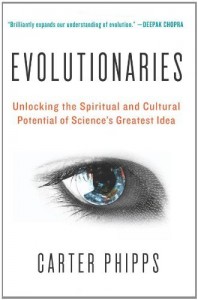
I capped off my summer reading with what was for me a fascinating and important book – Evolutionaries by Carter Phipps. Phipps is the editor of EnlighteNext magazine and enthusiastic about the evolutionary worldview and how it is showing up in many different fields, from biology to sociology to philosophy and theology, transforming our very understanding not simply of the cosmos, but of ourselves. Over the past few years, readers of this blog have probably picked up on the interest that my colleague Gibran Rivera and I share with Phipps when it comes to the evolutionary worldview. Evolutionaries does a wonderful service in deepening and broadening as well as bringing much more nuance to this perspective, rendering it more timely, accessible and applicable to the work of social change. Read More
May 4, 2012
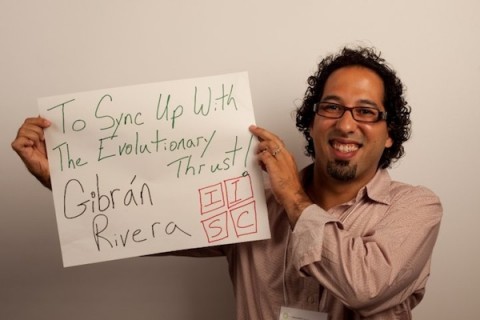
I am so proud of my colleague, Gibran Rivera, for the due recognition that he has received lately in various quarters for his deep thinking and transformative work. And I am grateful for how eloquently he captures the nature and intention of our collective work the Interaction Institute for Social Change in a recent interview:
“IISC seeks to make the invisible visible. When we are successful, people find themselves working in ways that are life-giving, generative, and unlike most of their experiences of working together. We achieve this by paying close attention to process. Process works best when everyone knows what it is and where we are [in] it. But process is not enough. We seek to create spaces and conditions that foster connectivity at the level of authentic relationship. When we are working in authentic relationship with one another, when we learn to connect to each other in the place where our shared purpose meets, then it can feel like the work is happening all by itself. But these spaces have to be designed; they have to be held and they have to be tended to. This is where we come in. And this is how interconnectedness becomes palpable.”
January 13, 2012
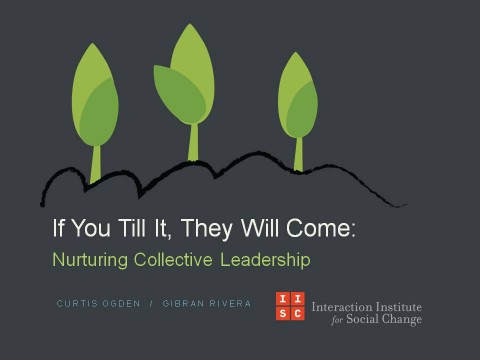
On the cusp of the Martin Luther King Jr. day of remembrance and celebration, IISC is gearing up to lead a webinar on the day after the Monday holiday focused on a very relevant topic – collective leadership. Much is being made of the Occupy Movement and its potential for showing us a new way to lead (we would call it leader-full, not leader-less). Prior to this important civic groundswell, many have been looking at how to create the conditions for emergent and collaborative leadership to move us in more just and life-affirming directions. Given the complexity of the issues we face and the diversity of perspectives in our various systems, it has been recognized that we cannot rely on individual, expert, or command-and-control leadership to move us forward. We must unleash more robust and adaptive collective intelligence. If this conversation interests you, come join Gibran Rivera and me as we explore stories of and practices for creating the conditions to unleash leader-full momentum that embodies and leads to the social change we seek. More information about this free opportunity can be found here.
January 12, 2012
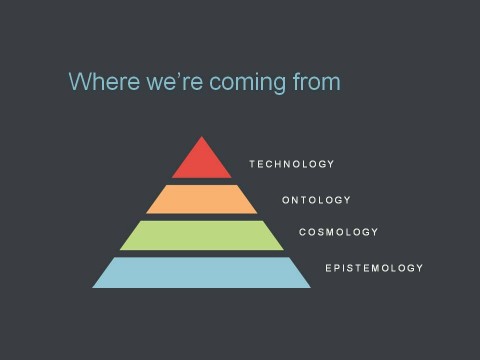
Next Tuesday, my colleague Gibran Rivera and I are excited to lead a webinar hosted by our friends at the Leadership Learning Community called “If You Till It They Will Come: Nurturing Collective Leadership.” The above slide is a bit of a sneak peak, and certainly one of the headier, nonetheless important, elements we will cover. The idea behind this graphic comes from the work of Carol Sanford, who has highlighted the fact that our leadership and change methodologies are always grounded in an underlying belief system about what we hold to be true about the world and humanity. Not being aware of or transparent about this can get us into difficulty when we are mixing and matching techniques/methods that may contradict one another, or when we are not operating from the same system of beliefs as others. So here is how we are tracing the roots of our approach to cultivating collective leadership for social change: Read More
 At IISC, we continue to emphasize that networks, not organizations, are the unit of social change. Part of the reason for this is that networks at their best are able to leverage what are known as “network effects.” These effects, as described by Madeleine Taylor and Peter Plastrik, include the following:
At IISC, we continue to emphasize that networks, not organizations, are the unit of social change. Part of the reason for this is that networks at their best are able to leverage what are known as “network effects.” These effects, as described by Madeleine Taylor and Peter Plastrik, include the following:










